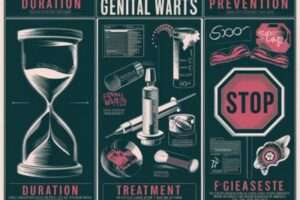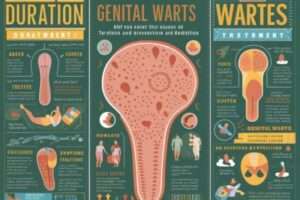Genital Warts: Duration, Treatment, and Prevention – A Comprehensive Guide
Have you ever wondered how long genital warts last? If you’re dealing with this common sexually transmitted infection (STI) or simply want to be informed, you’re in the right place. In this comprehensive guide, we’ll explore everything you need to know about genital warts, from their cause and duration to treatment options and prevention strategies.
Butyric Acid: The Gut-Friendly Compound You Need to Know About

Table of Contents
ToggleUnderstanding Genital Warts
Before we dive into how long genital warts last, let’s first understand what they are and what causes them.
What are Genital Warts?
Genital warts are small, flesh-colored bumps that appear in the genital area. They’re caused by certain strains of the human papillomavirus (HPV), primarily types 6 and 11. According to the Centers for Disease Control and Prevention (CDC), genital warts are the most common sexually transmitted infection in the United States, affecting about 1% of sexually active adults.
Syphilis Testing: A Comprehensive Guide to Diagnosis and Screening

How Do You Get Genital Warts?
Genital warts are typically transmitted through:
1. Sexual contact with an infected person
2. Skin-to-skin contact in the genital area
3. Rarely, from mother to child during childbirth
It’s important to note that you can contract HPV even if your partner doesn’t have visible warts, as the virus can be present without symptoms.
Oral Gonorrhea: A Comprehensive Guide to Symptoms, Diagnosis and Treatment

How Long Do Genital Warts Last?
Now, let’s address the burning question: how long do genital warts stick around? The answer isn’t straightforward, as it can vary from person to person.
Without Treatment
If left untreated, genital warts may:
1. Disappear on their own: In about 20% of cases, genital warts clear up without intervention within 3 months to 2 years.
2. Persist indefinitely: Some people may have warts that last for years if not treated.
3. Recur: Even if warts disappear on their own, they may come back later.
Remember, even if the warts are gone, the HPV virus may still be present in your body.
With Treatment
When treated, genital warts typically clear up faster:
Hepatitis A, B, and C: Understanding the Differences and Similarities
1. Most treatments take 1-3 months to completely remove the warts.
2. Some treatments, like surgical removal, can get rid of warts in a single session.
3. However, recurrence is common, with about 30% of cases seeing warts return within 3 months of treatment.
Factors Affecting Duration
Several factors can influence how long genital warts last:
1. Your immune system: A strong immune system can fight off the virus more effectively.
2. The specific HPV strain: Some strains are more persistent than others.
3. Treatment adherence: Following your treatment plan consistently can lead to faster clearance.
4. Lifestyle factors: Smoking, stress, and poor nutrition can prolong the duration of warts.
Understanding Hepatitis B: Transmission, Prevention and Treatment
Treatment Options for Genital Warts
While genital warts can clear up on their own, many people opt for treatment to speed up the process and reduce the risk of transmission. Here are some common treatment options:
Topical Medications
1. Imiquimod (Aldara, Zyclara): This cream stimulates your immune system to fight the virus.
2. Podofilox (Condylox): A solution that destroys wart tissue.
3. Sinecatechins (Veregen): A green tea extract ointment that boosts your immune response.
These treatments typically take several weeks to months to be effective.
In-Office Procedures
1. Cryotherapy: Freezing the warts with liquid nitrogen.
2. Electrocautery: Burning off the warts with an electric current.
3. Surgical excision: Cutting out the warts.
4. Laser therapy: Using laser light to destroy wart tissue.
These procedures can often remove warts in a single session, but multiple treatments may be necessary for complete clearance.
It’s crucial to consult with a healthcare provider to determine the best treatment option for your specific case.
Preventing Genital Warts and Recurrence
While treatment is important, prevention is key. Here are some strategies to prevent getting genital warts or experiencing a recurrence:
1. HPV Vaccination: The HPV vaccine can protect against the most common wart-causing strains of HPV. The CDC recommends vaccination for all preteens aged 11 or 12 years, and for everyone through age 26 if not vaccinated already.
2. Safe Sex Practices: Use condoms and dental dams during sexual activity. While these don’t provide 100% protection against HPV, they can significantly reduce the risk of transmission.
3. Regular STI Screenings: Regular check-ups can help catch and treat genital warts early.
4. Boost Your Immune System: A strong immune system can help your body fight off HPV. Eat a balanced diet, exercise regularly, manage stress, and get enough sleep.
5. Quit Smoking: Smoking can weaken your immune system, making it harder for your body to clear HPV.
Living with Genital Warts: Emotional and Relationship Aspects
Dealing with genital warts isn’t just a physical challenge; it can also affect your emotional well-being and relationships. Here are some tips for coping:
1. Educate yourself: Understanding the condition can help reduce anxiety and empower you to make informed decisions.
2. Communicate with partners: Be open and honest with sexual partners about your condition.
3. Seek support: Don’t hesitate to reach out to support groups or a therapist if you’re struggling emotionally.
4. Focus on overall health: Taking care of your physical and mental health can help you manage the condition better.
Conclusion
While genital warts can be frustrating and persistent, remember that they’re a common and manageable condition. With proper treatment and preventive measures, you can effectively manage genital warts and reduce their impact on your life. Always consult with a healthcare provider for personalized advice and treatment options.
Reference to External Sources:
1. Centers for Disease Control and Prevention (CDC) – Genital HPV Infection Fact Sheet:
2. World Health Organization (WHO) – Human papillomavirus (HPV) and cervical cancer:
3. American Sexual Health Association – HPV:
4. National Health Service (NHS) UK – Genital warts:
5. Mayo Clinic – HPV infection:


